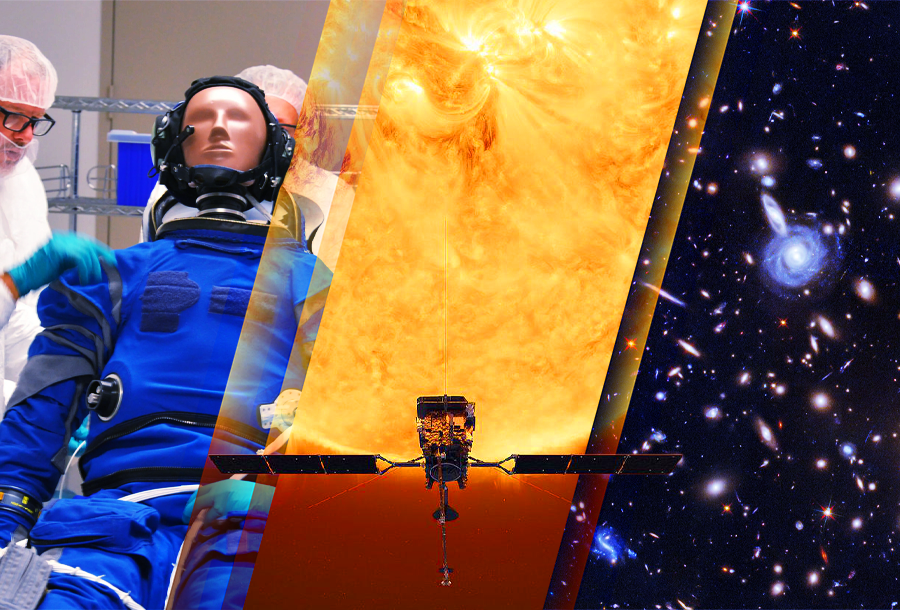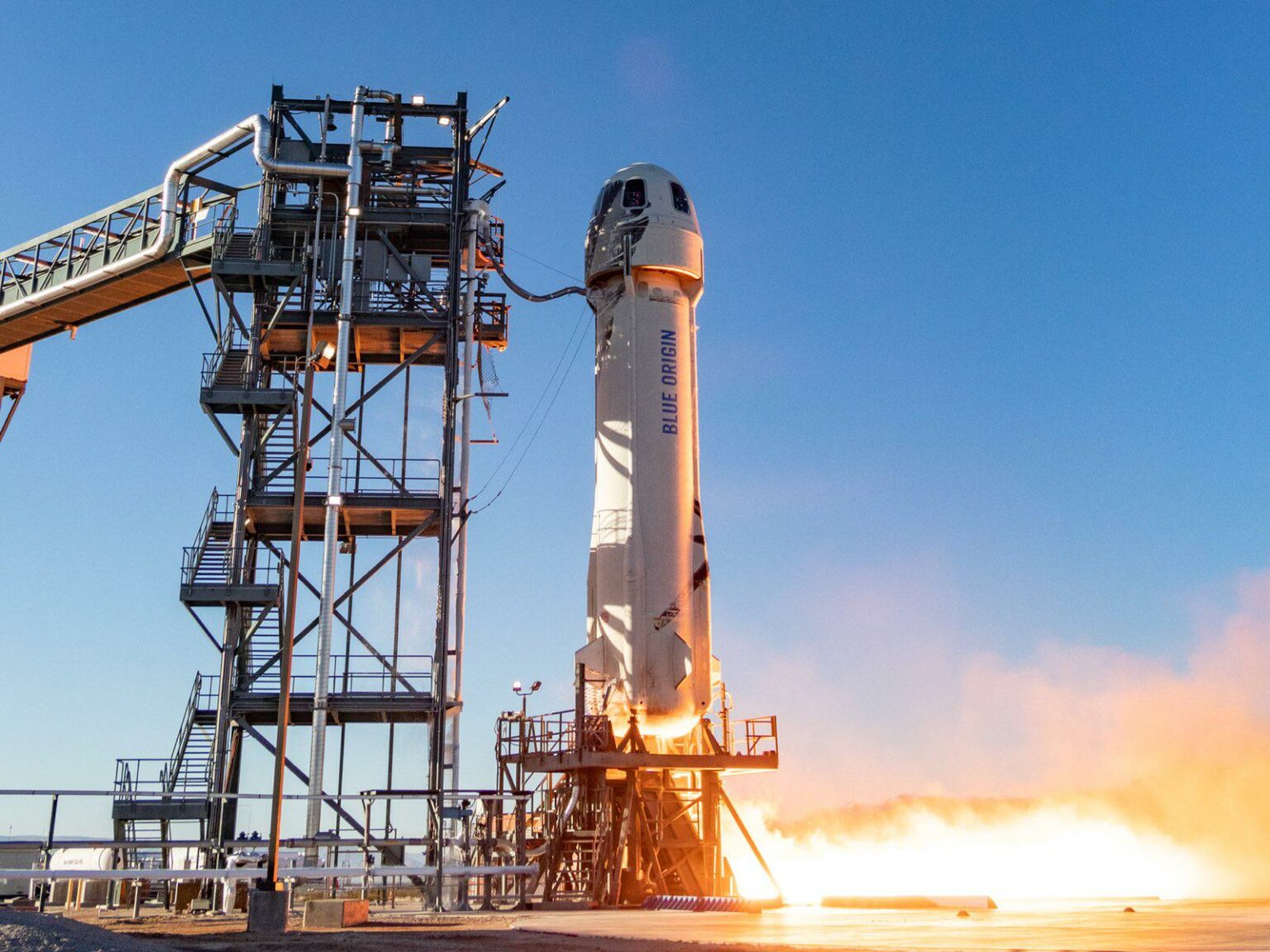Selection of space news for breakfast: Blue Origin postpones the launch of the New Shepard-21 mission for technical reasons. China will launch a large space telescope to explore distant galaxies, and the Boeing Starliner is already on the launch pad.

NASA puts ISS spacewalks on hold to investigate water leak
In March of this year, water leaked into a spacesuit helmet during a spacewalk. NASA is continuing to investigate this incident and is holding off on future spacewalks until engineers can resolve the problem.
The leak took place during the most recent spacewalk from the U.S. segment of the station March 23, involving NASA astronaut Raja Chari and European Space Agency astronaut Matthias Maurer. At the end of the nearly seven-hour spacewalk, Maurer reported that water had pooled on his visor.
NASA and Boeing set for second Starliner test flight
Boeing’s CST-100 Starliner spacecraft is ready to attempt another uncrewed test flight to the International Space Station, with both the company and the agency expressing confidence in the spacecraft despite past problems.
China will launch a big space telescope in 2023 to investigate distant galaxies
China wants to launch its first large space telescope in late 2023 to survey the skies, deliver new insights about distant galaxies, and unlock the mysteries of dark matter and dark energy. The Chinese Space Station Telescope (CSST) is an optical and ultraviolet space observatory that will boast a 6.6-foot-diameter (2 meters) lens, making it comparable to the venerable Hubble Space Telescope. Though the resolution of China’s telescope will be similar to Hubble’s, the CSST’s field of view will be 350 times larger.
Market News

Blue Origin delays next space tourist launch from May 20 due to vehicle issue
Jeff Bezos’ company Blue Origin will postpone its next suborbital space flight for vehicle reasons. This launch was supposed to be the fifth manned flight of the New Shepard spacecraft. “During our final vehicle checkouts, we observed one of New Shepard’s backup systems was not meeting our expectations for performance. In an abundance of caution, we will be delaying the NS21 launch originally scheduled for Friday. Stay tuned for further updates,” the company reported.
Kongsberg orders satellites for Norwegian maritime surveillance
Norway’s Kongsberg Defence & Aerospace has ordered three microsatellites to keep tabs on vessels operating clandestinely in the North Sea. Kongsberg ordered the satellites from Lithuania’s NanoAvionics for a 2024 launch. The satellites will have instruments Kongsberg has developed to detect Automatic Identification System (AIS) transponders, which all passenger ships and most ocean-going vessels above a certain tonnage must carry by law.
Inmarsat ELEVATE launched to accelerate IoT industry growth
Inmarsat, the world leader in global mobile satellite communications, has launched the ELEVATE program, consisting of three critical components necessary to accelerate the growth of the Internet of Things (IoT). According to the independent analytical and consulting company Omdia, the number of global satellite IoT connections will grow at an average annual growth rate of 25%. Inmarsat intends to support and further accelerate this rapid growth.
Ball and Raytheon win weather instrument study contracts
Ball Aerospace & Technologies Corp. and Raytheon Intelligence & Space will begin developing technologies for the National Oceanic and Atmospheric Administration’s next generation of geostationary weather satellites under contracts. Under the firm-fixed-price contracts awarded by NASA, NOAA’s partner for the acquisition, each company will receive approximately $5 million to perform a definition-phase study of the Atmospheric Composition instrument for the Geostationary Extended Observations program, called GeoXO.
Interesting
The sun as you’ve never seen it before
Powerful flares, breathtaking views across the solar poles, and a curious solar “hedgehog”. Scientists have published just some impressive images, films and data obtained by the Solar Orbiter during its first close approach to the Sun. Although the analysis of the new dataset has only just started, it is already clear that the ESA-led mission is providing the most extraordinary insights into the sun’s magnetic behavior and the way this shapes space weather.
NASA Investigates Voyager 1 Anomalous Telemetry
The Voyager 1 mission support group encountered a mystery. The spacecraft located in interstellar space is functioning normally, continues to receive signals from Earth and transmit the scientific information collected by its instruments. But at the same time, its orientation control system (AACS) has recently begun transmitting “junk” telemetry, which does not correspond at all to what is happening on board the probe.
Rocket Launches Could Be Polluting Our Atmosphere in Unexpected Ways
SpaceX, Blue Origin, and a host of other private companies helped to make 2021 the year with the most space launches in history, but scientists say this mad dash to space could be causing further damage to our atmosphere. Rocket exhaust can have a “significant cumulative effect” on the atmosphere, climate and human health, according to a new study. The researchers found that the production of nitrogen oxides (NOx), which make up the exhaust gases, can persist at high altitudes.
Space agencies provide global view of our changing environment
In response to the global COVID-19 pandemic, ESA, NASA and JAXA worked closely together to create an open-source platform, based on the Euro Data Cube, that used a wealth of data from Earth-observing satellites to document the worldwide changes happening to our society and the environment. Now, the COVID-19 Earth Observing Dashboard has been expanded to contain six new focus areas which offers a precise, objective and comprehensive view of our planet.
Follow us on Twitter to get the most interesting space news in time
https://twitter.com/ust_magazine

